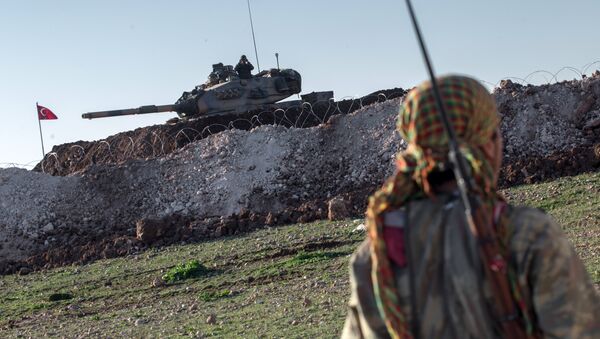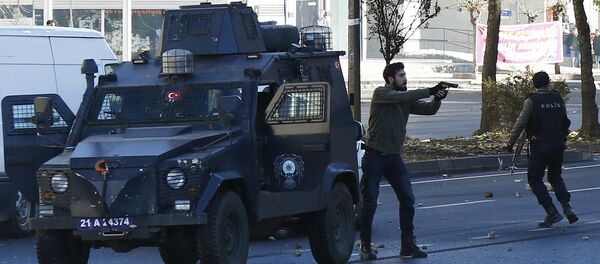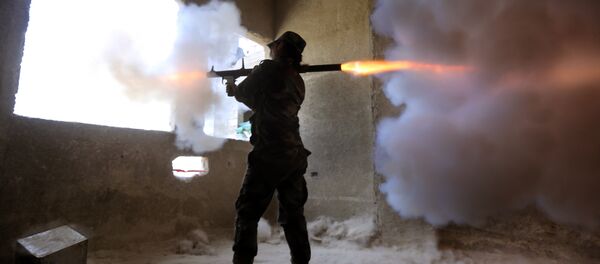In his piece, published in the independent online foreign and security policy magazine War on the Rocks, Bezci took a look back at classified documents stretching back to the Cold War era which demonstrated Turkey's long history of covert ops in neighboring states. However, he emphasized, in contrast to the Cold War period, Ankara today cannot count on the support of its traditional NATO partners, and vice versa.
"Turkish covert action carries the risk of diplomatic isolation from both its traditional Western allies and neighboring countries," the analyst explained. "More worryingly, it risks direct military conflict, as we have seen recently with Russia. However, this is not the first time that Turkey has grappled with such issues."
According to the analyst, "many of today's issues – including migration flows, weapons proliferation, and proxy war –appear in these documents, albeit with a Cold War flavor."
"In the 1950s," Bezci recalled, "Bulgaria, Turkey's northwest neighbor, was a prominent target for Turkish intelligence and an area of great interest to Turkey's Western friends."
Noting that the two countries had a long history of mutual animosity, stretching back to the late 19th century, when Bulgaria gained its independence from the Ottomans, the academic explained that Ankara's problems with Sofia only grew when Bulgaria joined the Soviet bloc in 1947, with Turkey soon answering by cooperating with, and then joining, the fledging Western alliance.
In particular, Bezci recalled, "the poor treatment of its remaining Turkish minority and its military buildup made Bulgaria a major threat in Ankara's eyes in the early Cold War."
The Turkish National Security Service (MAH), Bezci explained, was not only successful in "prevent[ing] communist infiltration, but also successfully recruited human intelligence assets among the immigrants."
Following the country's admission to NATO in 1952, "Turkish G-2 (military intelligence) and the MAH synchronized their aims and policies to bring them into line with NATO requirements," receiving help from NATO for SIGINT and other technical capabilities, while pursuing its own operations against the socialist bloc. "As Gen. Akcakoca from G-2 informed his NATO counterparts in 1953, the Turkish General Staff were best-informed on Bulgaria, with Romania and the Caucasus next in line."
After the mid-1950s, the researcher noted, "agents recruited from Turkish immigrants from Bulgaria" were able to play "a crucial role in revealing" figures on the Soviet Bloc's nuclear agenda and its uranium production, an effort which led "to very real improvements in Turkish intelligence efforts."
In 1960, with "Turkey and its Western allies…eager to reveal the details of missile systems near the Ludogorie region in northeastern Bulgaria," MAH once again "recruited a group of agents chosen from the quarter-million Turkish immigrants from Bulgaria."
"These immigrants," Bezci explained, "constituted good cover assets for missions in Bulgaria because they were fluent in Turkish and Bulgarian, knew the country, and had a feasible excuse to be there under the cover of visiting their families. After the MAH smuggled these assets into Bulgaria, they were able to detect the exact location of the missile ramps," and "returned to Turkey with their findings," the "intelligence [again] passed on to NATO's Intelligence Committee via Turkey's G-2."
Ankara's efforts in Bulgaria were not limited to intelligence collection, the analyst noted, and also included covert action missions. "The MAH supported opposition groups to encourage repatriation of Turks in Bulgaria to Turkey…In 1956, MAH regional chief Maj. Kamil Bey, based in the border city of Kirklareli, recruited a group of Bulgarian émigrés to engage in subversive activities in Bulgaria, including sabotage of military and economic targets. These agents were provided with cash, encrypted transmission devices, arms, and forged documents. Details of their targets and the outcome of their missions are not yet declassified."
Turkish intel and covert action ops in Bulgaria, Bezci notes, serve to demonstrate "that Turkey has a lengthy history of conducting covert and clandestine operations in neighboring countries. During the early Cold War, Turkey synchronized its foreign policy aims within a NATO context and its covert activities followed the same path." This, he explains, "ensured NATO support, prevented diplomatic isolation, and served as an insurance policy against Soviet aggression."
Today however, the academic warned, "in the case of the current Turkish government's policies in Syria, Ankara is playing the role of a maverick, its policies deliberately out of sync with its traditional Western allies. Covert action, such as arming the rebel groups in Syria, has been the main pillar of Turkey's recent Middle East policies," and has carried with it, in the analyst's view, "the assumption of great risks."
Ultimately, the analyst is hopeful that Ankara will learn "from its recent failures in the Middle East," and that "Turkey's clandestine policy will…follow the same path." As a result of its 'synchronization' of its approach with Western allies, Bezci hopes, the country will be able to "avoid direct confrontation with its neighbors."
Whether or not this is possible, so long as Recep Erdogan and his Justice and Development Party remain in power, remains to be seen.






